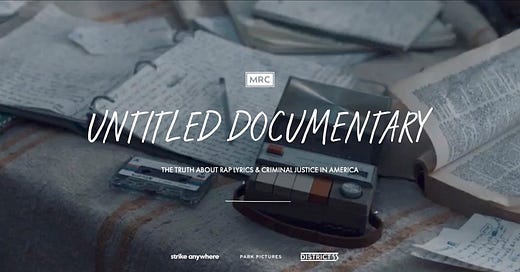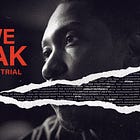The AS WE SPEAK Case Study (Part IV): From Inception to Emmy Nomination
Part IV: Up From the Depths
Read Parts I, II, and III of this series here:
Nearly every project stalls, and there is inevitably a moment where you feel like throwing it all on the shelf and moving on to the next endeavor. Any outside observer would assess the decision to walk away after months of seeming inactivity as a reasonable solution. Actually, a smart one.
But sometimes that just isn’t possible. For whatever reason, certain projects can’t be put down, and a creator just can’t stop envisioning the finished product. So they don’t walk away. They keep looking for a way to inch forward, even in the moment when there appears to be no viable path to success.
This is that phase…
The Final Attachment Agreement
In January 2021, we signed a six-month attachment agreement with Erik and Andrea, that would extend automatically by another six months in the event that the project recevied bona fide interest from a third-party buyer OR an actor/writer/director — subject to the rights owners’ approval. So this final agreement had built-in safeguards for both the owners (a six-month time window, plus approval rights of the third-party attachment), and for us (bona fide interest from a third party is all that was needed to extend the agreement by six months). Peter and I went out to the market with our old producing partner, Ryan Simon, trying once more to get Rap on Trial off the ground.
The first meeting was with a film financier who immediately took to the project. It was a small company, which will remain nameless, but had all the indicators of a perfect partner: the owner was a renowned First Amendment attorney who also sat on the Board of the Smithsonian. Coincidentally, he had also recently struck up some sort of social relationship with LL Cool J, which he brought up in the meeting because he thought that LL would be the idea match to come on board as an EP for the film. Though not totally convinced, we were open to the financier directly reaching out to LL, considering this appeared to be the most sure-fire way to get him to support the film and put in development funds.
By June (right up against our attachment agreement expiration), there was still no formal commitment from the financier, and nor had they formally pitched LL’s team. The financier was still interested in the project, which we got them to confirm in writing, such that we could extend our attachment agreement for another six months, but the confidence all around was diminishing. In hindsight, we had given far too much deference to a financier that never actually offered or committed anything to the project. So by late summer, we were finally looking at whether it was time to abandon the project altogether.
In late September, I gave a call to a mentor to get his take. I knew what he was going to say — he had represented enough independent films and produced a handful himself, and to him, the option was clear: acquire the option and go make the film. The issue was too important, and I had put too much time and energy into the project.
So I gave a call to a financier I had pitched years ago, Sam Bisbee, whose production company, Park Pictures, also represented commercial and film directors. He didn’t bite on the financing pitch, but did offer to pass the materials along to director J.M. Harper — a move that would fundamentally change the trajectory of the project.
Meeting with J.M. Harper
NOVEMBER 3, 2021 — My first conversation with J.M. (who goes by Jason), lasted an hour. The second was at least an hour and a half. From the moment we started discussing the potential development of the book Rap on Trial, our conversation jumped far beyond the issue of rap lyrics as evidence, to the history of Black art and music in America, and the true meaning of hip hop, social and economic policies in America’s urban centers over the last half century, and the theater of a courtroom, where presentation of evidence is ripe with misinterpretation and abuse. They were the most exciting Zoom calls I ever had, and Jason’s experience only made them more thrilling.
Along with his rising statue as a commercial director, Jason already had years of acclaim as a documentary editor, most recently on the Netflix series jeen-yuhs about the early career and life of Kanye West. Jason’s experience on jeen-yuhs was the perfect launching point to our discussion, as it was a deep dive into the humanity and psyche of an artist who would stop at nothing to break into the music industry, and to refuse any definitions that the industry put on him. Jason had spent years combing through archival material that had revealed Kanye at his most vulnerable, and as a result, he was able to share a portrait of an enigmatic, complex human (this was before Kanye’s Hitler-loving, neo-Nazi insanity). On top of that, Jason had spent his twenties touring in a band with his brothers, and had studied in America and Germany — he was the kind of global thinker and musical scholar that could take this project to places I could never imagine.
And that’s what he did.
Drakeo the Ruler killed
DECEMBER 19, 2021 - A month after I first spoke with Jason, Drakeo the Ruler was (allegedly) murdered backstage at a show in South LA. It was tragic, and from what I heard, would likely never be solved by an LAPD or LA County Sheriff’s office that had been embarrassed a year earlier in Drakeo’s mistrial. His killing also brought a morbid end our quest to follow Drakeo’s musical journey following his release from prison, a years-long journey to earn the trust of an artist and his team that never really got off the ground. Whether it was Jeff’s stonewalling, his team’s request for money, or the fact that Drakeo likely had aspirations of telling his own story, his untimely passing put an end to what was likely a partnership that was never meant to be, despite Erik’s intimate involvement with Drakeo’s partial acquittal, and our steadily strengthening bond with Drakeo’s lawyer, John Hamasaki.
But it also meant that Jason could embark on his own creative development process unencumbered by the principal plot that we had pursued for so long. Luckily, Jason still recognized the value of Drakeo’s story, especially as it fit within the broader narrative of the history of hip hip in Los Angeles, rooted in a relationship of brutality between the law enforcement and the historically Black communities of South LA, that he found a way to fit Drakeo’s story in his film treatment. Drakeo’s story would live on.
MRC takes over
By early 2022, with Jason on board, we pitched the project to MRC, the company that Pete and I were working with on anther doc series, BLACK BOX. For the first time in years, the pitch landed as we always knew it should. MRC’s former head of nonfiction, Amit Dey (they have since closed their nonfiction division), understood the concept instantly, and was excited that Jason had a unique creative vision for exploring rap in the context of a 400-year history of Black art in America.
What’s more, Jason had a wild card up his sleeve: He wanted to tell this story from the perspective of an artist. But not just any rapper, and especially not one that had already been accused of a crime, since the audience would immediately be put in a position to judge the person’s guilt or innocence. Instead, Jason chose to tell the story through the eyes of a rapper that had never been criminally involved or gang-affiliated, and who was credible enough in the rap world that he could lead the audience through the stack of issues contained within Rap on Trial — the meaning of the rhymes, the violence inherent in rap storytelling, the significance of a rapper’s name as his alter ego, for example. Discussion of all these topics had to come from within the rap world, from a person with whom an audience could relate, empathize, and ultimately root for. And Jason knew exactly who that rapper would be.
Jason had worked Kemba, an established, yet relatively unknown, rapper from the Bronx, a year prior on a facebook mini-doc. Kemba is soft spoken, and wise beyond his years. His music and lyrics elicit comparisons to James Baldwin, offering a reflection and analysis of his surroundings that you hear less and less in hip hop these days. After the release of an early mixtape, Kemba had been called on stage by Kendrick Lamar, who told the audience to keep an eye out for the young rapper. And when Jason and I first spoke about the possibility of including Kemba in this documentary, Jason remembered telling Kemba that they would work together again in the future, he just didn’t know how or when. Here was his opportunity.
Jason and Kemba’s facebook piece, a Clio Award-winning spot shot by incredible DPs Logan and Allison Triplett, effectively served as our proof of concept for MRC, an expression of the tone and visual storytelling that Jason would bring to the feature. The rest of the film — the artists and legal experts, would fill in the story around Kemba. It was a significant departure from the structure and style of the book, and for the first time, felt like we had something truly unique and elevated from the written source material. MRC was in.
On the legal side, since our attachment agreement had expired and no other financier or production company was officially attached to the project, MRC was in position to acquire the rights to RAP ON TRIAL directly from the authors — a process we expected to be a snap because a) Erik and Andrea no longer had to contract with me and Pete, with whom they had (understandably) grown quite frustrated, and b) we could point them directly to an incredibly reputable company, with credits including HOUSE OF CARDS, OZARK, and KNIVES OUT. These guys knew how to many movies.
Well, best laid plans, right? For a variety of reasons, those negotiations got off on the wrong foot. If you have ever seen an Option Purchase Agreement, the language can appear terribly restrictive, like you are signing away the rights to your life’s work with no recourse. This was the understandable reaction of Erik and Andrea to the initial paperwork sent over from MRC. On top of that, slow responses and miscommunications from lawyers on either side put the authors on their heels. I should have seen it coming, but after five years of promising Erik and Andrea the moon, when this big time studio finally came knocking, a process that was anything less than perfect would rattle them. And it did…
Young Thug Arrested
With the Rap on Trial negotiations marching on, but getting increasingly testy, and Jason diving deeper into his creative vision, news dropped that had the potential to alter this entire project: Young Thug was arrested on state RICO charges in Georgia, along with 27 other members of his Young Slime Life label. The indictment alleged that the record label was effectively a criminal cartel that had committed a slew of crimes. And the principal evidence in the charging documents? Young Thug’s lyrics.
For those unfamiliar with Young Thug, he is a megastar in global hip hop, and particularly in Atlanta. A prolific producer, rapper, and songwriter, Thug was by far the highest profile artist to face a criminal charge where the primary evidence against him was his lyrics. Without hesitation, we immediately put all our efforts into reaching out to the YSL team, scoured our networks to find a connection point to someone in the Young Thug orbit.
On May 20, 2022 (the day before my wedding!), we set a call with Thug’s manager. We told him that we had been developing this project for five years, that we had an incredible director attached, and a studio that was responsible for some of the biggest hits in film and television. Also, Erik was already in discussions with Thug’s legal team about potentially serving as an expert witness. We also told him that we would not be particularly intrusive of Thug’s time, or his team’s attention, as the broader focus of the film would be the issue of rap lyrics as evidence, and Thug’s story would just be the through-line. At the manager’s request, I drafted up an attachment agreement. They were interested….
Rights Negotiations Terminate
The next three weeks were insane. My wife and I celebrated our wedding on May 21, with my wife seven-months pregnant. A week later, her sister got married. And when returned home, we both got Covid.
All the while, we were waiting to hear back from Young Thug’s team, and the negotiation between Erik, Andrea, and MRC was descending into darkness — Pete and I could tell that five years of frustration were beginning to boil over. Even with an incredible studio offering to bring their book to the big screen, it appeared Erik and Andrea were past a point of no return emotionally. Nearly five years to the day after first sitting with them over dinner in New York, on June 15, 2022, the authors officially broke off negotiations with MRC and refused to option the rights to the book Rap on Trial.
Heartbreaking. Just heartbreaking. Five years of pushing this project up a hill, for no money, but with glimmers of hope along the way, all gone. In the days after their decision, I had long conversations with Erik about the future of the project — we had so much momentum, real talent attached, and a bona fide studio ready and willing to make the film. We were going to make this, and would still be open to either of his or Andrea’s attachment as a consulting producer to the film. Erik took us up on the offer, but he alone could not option the rights to the book. So now our project was not directly tied to existing IP….and it had no title.
The weeks went by, and we heard nothing back from Young Thug’s team. On July 8, news dropped the Alex Gibney’s Jigsaw Productions was going to make the official Young Thug documentary and podcast in partnership with Rolling Stone. Once again, our project as in peril.
But in the weeks after after, MRC’s head of development, Kelsey van den Bergh, had lunch she had with an executive at Paramount+ named Malik Johnson, who was VERY excited about what Jason was developing. He asked to hear a pitch, and by September, we set a date for Jason and I to meet in New York to meet with Malik and his team.
In September 2022, we pitched the Untitled Rap Lyrics Documentary to Paramount+ with Erik Nielson attached as a consulting producer. The pitch went well, but questions abounded: How would we get access to the Young Thug story? Exactly who was Kemba, and how would be used in the film? What was our budget and production plan?
This post is being published during the News and Documentary Emmys, so by the time you read it, you will likely be able to look and see if we won Best Arts and Culture Documentary. Either way, I hope this series has been an enjoyable recounting of the journey of documentary development. I know it has been a cathartic experience for me.
If you want to hear about the production and distribution process, leave a comment and I’ll see how much stamina I have left to recount all those twists and turns! Thank you for reading, and your outreach over the past several weeks. I’ve loved hearing your reactions.








